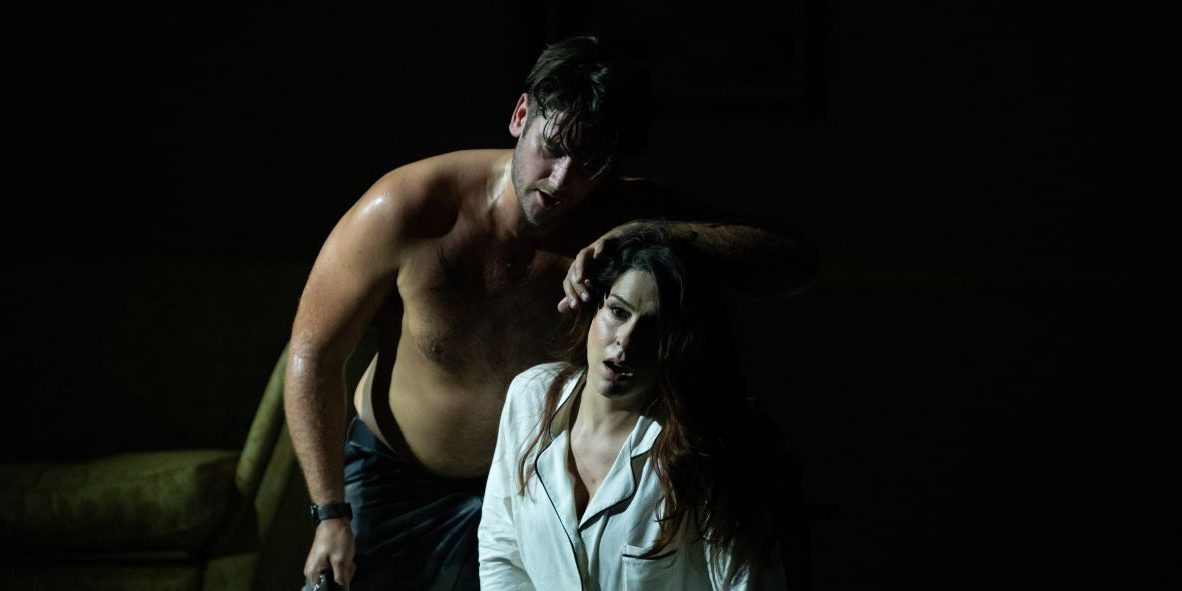This version of The Rape of Lucretia, co-produced by The Royal Opera and Britten Pears Arts provides a compelling evening at the Linbury Theatre. The chamber opera by Benjamin Britten was first performed in 1946, a year after Peter Grimes. It was a partial success but there was a good deal of criticism of the libretto, focussed partly on its somewhat florid style and partly on the Christian moralising that frames the final moments of the drama. Though I loved this performance, the fact that it was set in some unspecified twentieth century war zone and performed in modern dress served to highlight other problems with the text, in particular underlying assumptions about female sexuality which feel hopelessly outdated. When the opera is played in togas this somehow seems less disturbing, but today – when rape as a weapon of war is once again in the news thanks to events in Ukraine – to see an outdated text matched with the contemporary understandings of the directorial team made for an uncomfortable experience – but then depicting rape and its aftermath ought perhaps to be uncomfortable. Fortunately the music transcends the shortcomings of the libretto.
The opera begins with three soldiers discussing the fidelity of the women back in Rome. Tarquin, the Etruscan prince, – the Etruscans dominated Rome at this period – decides to test the fidelity of Lucretia, the virtuous wife of his comrade Collatinus. He rides back to Rome alone, demands a bed for the night and, in the darkness, enters Lucretia’s room and rapes her. Collatinus realises what Tarquinius has done and rides home. Though he tells Lucretia that he does not consider her guilty, she kills herself.
Throughout the opera two singers act as a sort of Greek chorus setting the scene, giving advice (unheard) to the protagonists and commenting on the action. For the most part this device works well enough but there are moments when it jars. An example – while Lucretia is being raped offstage, they dwell not on her suffering but on God’s sorrow at the evils men perpetrate. These chorus roles are sung with passion and haunting sadness by Sydney Baedke and Michael Gibson who carry files and photographs as if recounting an atrocity from the past. There is an outstanding performance from British baritone Jolyon Loy as Tarquinius – acting and singing the role of entitled aristocrat with a persuasive mix of arrogance and self absorption. Anthony Reed and Kieran Rayner as Collatinus and Junius are less forceful in their roles as passive victims of Tarquinius’ crimes but provide beautifully sung accounts of their music. Lucretia and her companions are similarly convincing musically – the trio near the end of Act I is marvellous – and Anne Marie Stanley had the sort of deep mezzo voice that sends shivers down the spine in moments of tragedy. And though her reaction to the violation made for a totally convincing drama, once again the text felt at odds with the action on stage.
So I must return to the music which is superb, and superbly delivered, in this performance – by turns contemplative, fractured, menacing and despairing. And all the singers thrived in the sympathetic space and acoustic of the Linbury Theatre. Corinna Niemeyer brought the best out of her young singers – and out of the splendid twelve piece Aurora Orchestra. The production perhaps tried too hard to point up the modern relevance of the story but, as a response to the strange libretto, that is not a sin that is difficult to forgive. A qualified triumph for Oliver Mears and his team.

